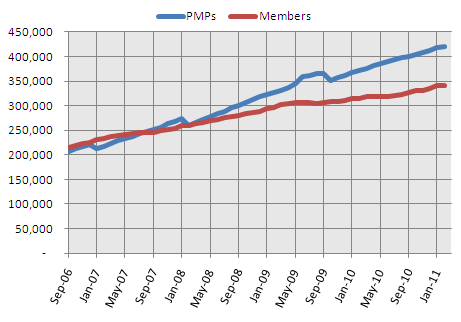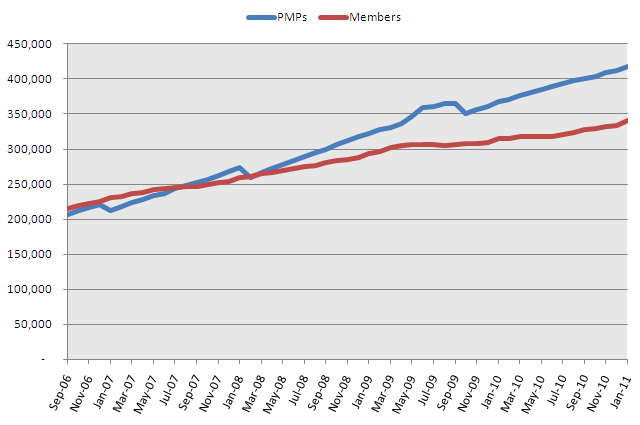 I'm happy to announce that I will be speaking at AgileDC 2011. My session, When PMI Introduced the Elephant in the Room, will be part of the Enterprise Agile track.
Last October I entered the Gaylord National with a little trepidation. The PMI North American Congress was taking place and I found out that several people I admire in the Agile space were going to be attending and speaking. Leading up to the major PMI event, I was hearing a lot of chatter about these "heretics" who were going to be presenting. In Washington DC, the PMP was king and few in the Federal space wanted to hear anything about adaptive planning, continuous elaboration, or focusing on delivering value to the customer. Project Managers were expected to predict the future, define process and then make damn sure you followed it, regardless if anything ever got delivered. So, I was very much surprised as I walked through the Gaylord and noticed poster after poster, display after display. "Are you Agile?"
I'm happy to announce that I will be speaking at AgileDC 2011. My session, When PMI Introduced the Elephant in the Room, will be part of the Enterprise Agile track.
Last October I entered the Gaylord National with a little trepidation. The PMI North American Congress was taking place and I found out that several people I admire in the Agile space were going to be attending and speaking. Leading up to the major PMI event, I was hearing a lot of chatter about these "heretics" who were going to be presenting. In Washington DC, the PMP was king and few in the Federal space wanted to hear anything about adaptive planning, continuous elaboration, or focusing on delivering value to the customer. Project Managers were expected to predict the future, define process and then make damn sure you followed it, regardless if anything ever got delivered. So, I was very much surprised as I walked through the Gaylord and noticed poster after poster, display after display. "Are you Agile?"
Every Agile session I attended, PMI Vice President of Information Technology, Frank Schettini introduced the speaker and told the audience that he leads the team that is responsible for delivering value to PMI’s members, volunteer leaders, certification holders and staff through innovative and reliable technology solutions. He said that he was a strong supporter of the Agile Community and so was PMI.
Though the audience at one of the first Agile sessions was almost hostile towards the presenters, by the time Michele Sliger gave the final session on the final day of the conference, there was buzz in the halls of the Gaylord about how "this Agile thing" had taken the conference by storm.
Agile was about to cross the chasm and PMI was going to make sure we made it to the other side.
But first, introductions were in order.
I will talk about the current state of Agile and how I see the landscape changing, with the introduction of the new PMI Agile certification. I will compare and contrast the PMI-ACPsm to the PMP® as well make some predictions for things to come.
Now, don't come to just hear me talk! This year, the keynote speakers will be Agile luminaries Ken Schwaber and Sanjiv Augustine. It should a great conference. If you're interested in 15% discount, please contact me directly.




 , it made me stop and question why people wanted to get the PMP or APP. Are we trying to discover better ways to deliver value to customers or just trying to get a piece of paper and a few extra letters after our names? Dan breaks it down to pursuing the mastery of performance-based objectives versus learning-based objectives (ie. getting a passing score on a certification exam versus learning new approaches to deliver value to customers).
, it made me stop and question why people wanted to get the PMP or APP. Are we trying to discover better ways to deliver value to customers or just trying to get a piece of paper and a few extra letters after our names? Dan breaks it down to pursuing the mastery of performance-based objectives versus learning-based objectives (ie. getting a passing score on a certification exam versus learning new approaches to deliver value to customers).




